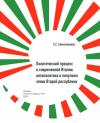27–28 сентября в Лондоне состоялась встреча Евро-Атлантической группы лидеров в сфере безопасности (Euro-Atlantic Security Leadership Group).
В состав Группы входят бывшие и действующие высокопоставленные государственные деятели, дипломаты, международные чиновники и бизнесмены из США, Великобритании, Франции, Италии, Латвии, Польши, Румынии, Нидерландов, Швеции и других стран Европы; ее задачей является разработка предложений по новым подходам к европейской и атлантической безопасности, сформулированным в начале 2015 г. президентом РСМД Игорем Ивановым, бывшим сенатором США Сэмом Нанном (Sam Nunn) и бывшим министром обороны Великобритании Десмондом Брауни (Desmond Browne).
На заседании Группы обсуждались последние политические изменения в Европе, новые вызовы безопасности в евро-атлантическом пространстве, механизмы стимулирования широкого общественного диалога и расширения контактов между экспертными центрами по вопросам европейской безопасности. В работе Группы приняли участие президент РСМД Игорь Иванов и генеральный директор РСМД Андрей Кортунов.
Текст выступления Игоря Иванова
Dear friends!
As you remember, three years ago the Nuclear Threat Initiative released a report on Building Mutual Security in the Euro-Atlantic Region. In the very beginning of the report we argued that “the Euro-Atlantic security must be improved or the existing risks will grow. The window for building trust, confidence, and mutual security will not remain open indefinitely”.
Back in 2013, the “window of opportunity” was still wide open, and some critics considered our position to be too pessimistic, gloomy, even alarmist. Unfortunately, we turned out to be right. The three years since the publication of the EASI Report were saturated with dramatic developments and conflicts in the Euro Atlantic space. Our world changed — and it did not change for the better.
The Ukrainian crisis and deep divisions between Russia and the West. New tensions between Europe and Turkey and the challenge of uncontrolled trans-border migrations. Brexit and the powerful opposition to the trans-Atlantic economic integration. Political radicalism and violent terrorism sweeping all over Europe.
One can talk a lot about these and other problems that countries of the Euro-Atlantic space have to face today. Of course, each of these problems has its own roots, its logic and its dynamics; they are not necessarily directly linked to each other. However, there is something that unites all of them, something that necessitates a consolidated response to these problems.
The sad truth is that despite profound changes that took place in our continent since the end of the Cold War, we all failed to develop, to negotiate and to put into practice a truly new approach to security in the Euro-Atlantic space. It is easy to blame each other for this historic failure. Nevertheless, no matter who is to put the blame on, we all should confess that all the countries of our region are less secure today than they were yesterday. All of us are getting more and more vulnerable in front of new security threats and challenges.
So what should we do now? First, in my view, we should all recognize the gravity of the current situation. The danger of a direct military confrontation in Europe with conventional or even with nuclear weapons cannot be completely ruled out. Moreover, even if we avoid such a confrontation, the prospect of a long-term political conflict dividing our common continent looks more than real. Furthermore, Europe has already slipped into a new cycle of the arms race. This fundamental reality will not fade away; it will not disappear on its own, if we in the West and in the East do nothing to change it. The time to act is now; we cannot rely on future generations to handle problems that we ourselves created.
Second, we need a serious high-level political discussion on the fundamentals of regional security. In the East and in the West they often refer to the same notions of international law, to the same international agreements, even to the same values. Nevertheless, the understanding of the notions, agreements, and values might be very different in the East and in the West. Without clarity on the matters of principle, it would be extremely hard, if possible at all, to move ahead.
Such a discussion could start within the framework of OSCE or in a different format. The most important thing is to make sure that this dialogue would get an appropriate political mandate at the highest level. We should also try to avoid ungrounded expectations of swift positive changes: this dialogue might take years to generate tangible results. However, without such a dialogue we would never be in a position to turn back the dangerous political dynamics that we can witness today.
The most significant outcome of such a dialogue would be a common understanding of security challenges and threats to our region, including their roots, genesis, evolution and the most efficient ways of dealing with these challenges and threats. This common understanding should go beyond traditional “hard security” problems and should embrace such challenges of the future as cyber, climate, migrations, food security and so on.
One should note that most of these threats come not from states, but rather from non-state actors. When we talk about international terrorism or cyber war or drug traffic, we have to recognize that no state can possibly benefit from these problems and every state is endangered by these threats. What we see happening today, is a gradual erosion of the state system with growing numbers of failed states emerging. The Middle East crisis is probably the most graphic demonstration of this trend. I am sure that this is a challenge common to both Russia and the West.
Let me stress once again — this is a long-term process, which is unlikely to change in a radical way the security situation in the Euro-Atlantic space in the immediate future. Therefore — and this is my third suggestion — we should put in place mechanisms of ‘rapid reaction’ to various crisis situations in order to avoid risks caused by technical errors, human mistakes or other accidental factors. Such mechanisms between Moscow and Washington existed during the Cold War and they provided for an acceptable level of stability and mutual predictability.
Today we need such “rapid reaction” mechanisms even more than during the Cold War because the new threats are more difficult to foresee and to preempt than the old ones. All major terrorist acts came as a surprise. Nobody predicted the depth and the scale of the migrations crisis that broke out last year. We have enemies who are more numerous, more flexible and more adaptive than our adversaries during the Cold war. Unfortunately, our responses to new challenges are often delayed and lacking a common vision. A “rapid reaction” infrastructure could be put in place relatively fast provided we have the needed political will and commitment on both sides.
My forth point would be to prepare an inventory of instruments, mechanisms and procedures that we used (or misused) in Europe over last thirty years. None of them turned out to be strong enough to successfully cope with the current crises, but it does not mean that all of them are useless or antiquated.
In my view, it would be very hard now to launch any new institutions in Europe — there is a profound institutional fatigue both in the East and in the West and a general reluctance to invest political capital into new grandiose plans. Therefore, it appears more practical to modify and to reset the institutions that we already have in place making them more receptive to the realities of the XXI century.
Finally, let me make my fifth point about civil society. I am deeply concerned about the unprecedented alienation between the West and the East in Europe, about the rise of hostile and inflammatory rhetoric, about the propaganda war that takes place in front of our eyes. A major responsibility of civil society institutions, think tanks, professional associations and networks today is to reverse this unfortunate and dangerous trend. Every new cycle of confrontation makes this task more and more difficult.
We at the Russian International Affairs Council consider this work to be a major priority and we are ready to collaborate with our friends and colleagues across Europe and in US in order to prevent a new division of Europe. Only working together, we can hope for a success.
Thank you for your attention.



